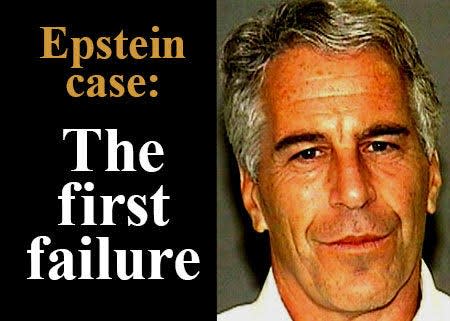New law to release Jeffrey Epstein grand jury documents takes effect July 1. What's next?
The new state law meant to smooth the way for the release of the transcripts of the 2006 Jeffrey Epstein grand jury proceedings takes effect on Monday, July 1.
The Palm Beach Post, which sued in 2019 to make public what happened during the secret proceedings, has filed a new motion for Circuit Judge Luis Delgado to consider its argument under the new law. The grand jury indicted Epstein on only one count of solicitation of prostitution — what a "john" might face for soliciting an adult sex worker.
Nothing is likely to happen before Monday, July 8, when a hearing is scheduled for Delgado to listen to The Post's arguments. The judge would then issue an order — either at the end of the hearing or later. The Post plans to make the transcripts available to the public as soon as possible after they are released.
Names of Jeffrey Epstein victims likely to be redacted
Another part of Delgado's job is to redact names of victims and others who might need to be protected. It's a part of the law that hasn't changed. So it might take even more time after the order for him to do that. The Post has always supported redactions.
The grand jury indicted Epstein after then-State Attorney Barry Krischer torpedoed the case that his office presented in secret, sources told The Post in its 2019 investigation "Jeffrey Epstein: The First Failure."

Only one victim testified and the prosecutor who presented the case, an assistant state attorney who was the head of the child sex crimes unit, Lanna Belohlavek, undermined her own witness by trotting out the girl's MySpace pages. The social-media excerpts had been supplied to prosecutors by Epstein's lawyers.
Taking the matter to the grand jury was an unusual move for a state attorney. Krischer was always free to file charges against Epstein himself. It was the first ever sex crimes case that went before a grand jury in Palm Beach County history.
Grand jury proceedings are secret for a couple of reasons. One is shielding a target's identity if they don't end up being charged. The secrecy also allows witnesses to speak more freely.
Jeffrey Epstein case: Here are the main players in the early case and where they are now
Prosecutors, however, have been accused of using the secrecy to provide political cover in controversial cases such as police shootings.
Current law allows the veil of grand-jury secrecy to be lifted only when a judge decides that it's needed to check whether a witness' testimony in court matches what they said before the grand jury and to determine whether the witness has committed perjury.
The other reason is when it furthers justice. That's the part of the law that The Post has used in its arguments to help the public and the victims understand whether there was a miscarriage of justice.
More: Jeffrey Epstein 2006 grand jury transcripts already released. Why you can't see them now
Change in law meant to apply only to Epstein case
The change in the law, an addition to it, is meant to apply only to the Epstein case, according to the bill's sponsors, Florida Sen. Tina Polsky and Rep. Peggy Gossett-Seidman, a Democrat and a Republican, respectively, both of Boca Raton.
The amendment requires that the subject of the proceeding is dead, that the case involved sex crimes against minors, that the state attorney is notified before the release and that the material already has been released under a judge's order.
The Epstein transcripts, it turns out, were released in October 2020 when Ghislaine Maxwell's prosecutors sought them in building their sex trafficking of minors case against Maxwell. It's unknown whether the material was used in the Maxwell case because they haven't been released.
Maxwell was convicted in 2021 and sentenced to 20 years. She is serving her time in a Tallahassee prison.
If you or someone you know has been a victim of sexual assault, the Palm Beach County Victim Services and Rape Crisis Center can help. Reach their helpline at 561-833-7273, or toll-free at 866-891-7273.
Holly Baltz is the investigations editor at The Palm Beach Post. You can reach her at hbaltz@pbpost.com.
This article originally appeared on Palm Beach Post: Jeffrey Epstein grand jury records law takes effect July 1
